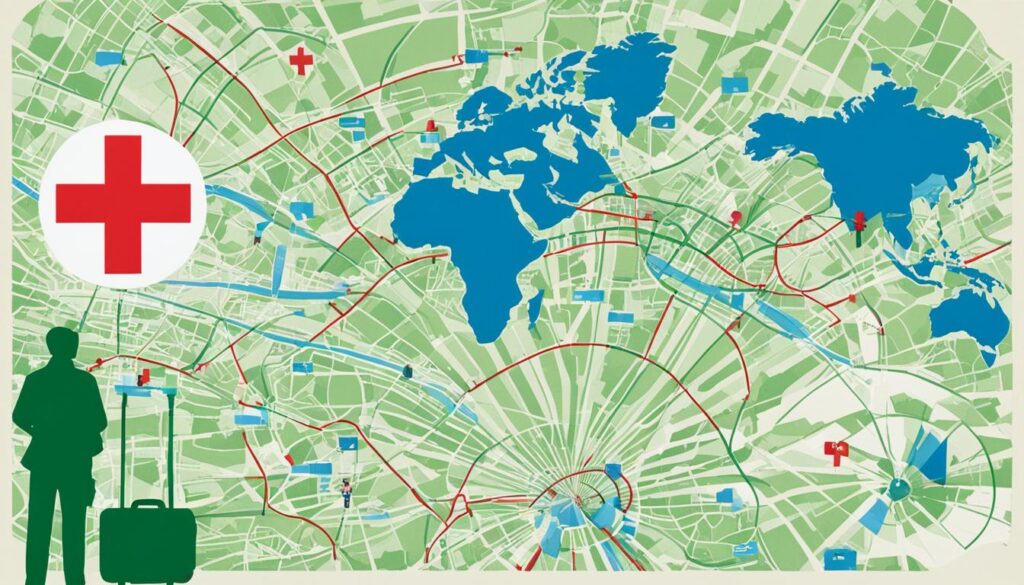Are you planning an upcoming trip? While travel can be an exciting adventure, unexpected events such as a medical emergency can quickly derail your plans. That’s where travel insurance for health emergencies comes in. By providing medical coverage and emergency medical expenses, travel insurance can give you peace of mind and protect you from costly bills if an emergency arises during your trip.
In this guide, we’ll provide a comprehensive overview of travel insurance for health emergencies, including the types of medical coverage available and how to handle emergency medical expenses while traveling. With this information, you can make an informed decision and choose the right travel insurance policy to ensure a worry-free trip.
Understanding Travel Insurance
When it comes to travel, there are so many things to consider – where to go, where to stay, what to pack – that it’s easy to overlook one of the most important aspects of all: travel insurance. Whether you’re planning a quick weekend getaway or a longer international trip, having travel insurance is essential.
So, what exactly is travel insurance? Travel insurance is a policy that covers you financially for unexpected events that may occur during your trip, such as urgent medical treatment, trip cancellations, or lost or stolen luggage. International travel insurance offers additional benefits, such as coverage for political evacuation or repatriation due to an accident or illness.
| Benefits of Travel Insurance: | Why it’s Essential: |
|---|---|
|
|
Travel insurance can provide you with essential protection and peace of mind during your travels. With the right coverage, you can rest assured that unexpected medical expenses or other emergencies will be taken care of, even when you’re far from home. So, before your next trip, make sure to take the time to understand the basics of travel insurance and find the policy that’s right for you.
Types of Travel Insurance Policies
Travel insurance policies come in various types, each with unique benefits and coverage options. Being aware of the different types of policies available can help you select the one that best suits your travel needs.
Comprehensive Plans
A comprehensive plan is an all-in-one policy that provides coverage for a range of situations, such as trip cancellations, medical emergencies, and baggage loss. This type of policy typically offers the highest level of protection and peace of mind.
Medical-Only Coverage
A medical-only policy provides medical coverage for emergency situations, such as illness or injury while traveling abroad. This policy is ideal for individuals who already have coverage for trip cancellations or itinerary changes but require coverage for medical emergencies.
Trip Cancellation Insurance
Trip cancellation insurance provides coverage for non-refundable travel expenses if your trip is unexpectedly cancelled or delayed. This type of policy is ideal for individuals who need financial protection for prepaid expenses, such as airfare or hotel reservations.
| Type of Policy | Benefits |
|---|---|
| Comprehensive Plan | Provides an all-in-one policy, offers high level of protection for various situations like trip cancellations, medical emergencies, and baggage loss. |
| Medical-Only Coverage | Provides medical coverage for emergency situations like illness or injury while traveling abroad. Ideal for individuals who already have coverage for trip cancellations or itinerary changes but require coverage for medical emergencies. |
| Trip Cancellation Insurance | Provides coverage for non-refundable travel expenses if your trip is unexpectedly cancelled or delayed. Ideal for individuals who need financial protection for prepaid expenses, such as airfare or hotel reservations. |
Ensure to review the policy carefully to identify limitations and exclusions that may apply and get the coverage that meets your specific needs.
Coverage for Medical Expenses
Medical coverage is an essential aspect of travel insurance, providing financial protection in case of unexpected illness or injury during your trip. With travel insurance, you can have peace of mind knowing that you are covered for medical expenses, including:
| Medical Expenses Covered by Travel Insurance |
|---|
| Doctor Visits |
| Hospital Stays |
| Prescription Medications |
| Emergency Dental Care |
It is important to note that each travel insurance policy has different coverage limits and exclusions. For example, some policies may not cover pre-existing medical conditions or have maximum coverage limits. Make sure to carefully review and understand the terms and conditions of your policy.
In case of an emergency, contact your travel insurance provider immediately to understand the next steps in making a claim for the medical expenses. Collect all necessary documents, including bills and medical records, to ensure a smoother process.
With travel insurance, you can have the peace of mind of being covered for unexpected medical expenses. Ensure you have adequate medical coverage and that you understand all policy limitations and exclusions before traveling.
Emergency Evacuation Coverage
When you’re traveling, unexpected events can happen, and sometimes they require emergency evacuation. Whether it’s due to a natural disaster or political unrest, emergency evacuation coverage can help you in times of need. That’s why it’s essential to include this coverage in your travel insurance policy.
But what exactly is emergency evacuation coverage? It’s insurance that covers the cost of transportation to the nearest appropriate medical facility or back to your home country if needed due to a medical emergency. In addition, it can also cover the costs of local transportation, such as flights, ground transportation, and accommodations.
Without coverage, the costs associated with an emergency evacuation can be exorbitant, leaving you with a hefty bill to pay. Therefore, it’s crucial to ensure that your travel insurance policy includes this type of coverage for unexpected emergencies.
Scenarios Requiring Emergency Evacuation
Several scenarios might require you to undergo emergency evacuation during your travels. These include natural disasters such as hurricanes, floods, and earthquakes, as well as political unrest or war. If you become ill or injured while traveling and need medical attention that is not readily available in the area, emergency evacuation can also be necessary.
Don’t risk your wellbeing and financial stability while traveling. Make sure your travel insurance policy includes emergency evacuation coverage and know-how to access help in case of an emergency.
Choosing the Right Travel Insurance Policy
Choosing the right travel insurance policy can make all the difference in the event of a health emergency during your trip. Here are some tips to help you make an informed decision:
- Consider the coverage options offered by the travel insurance policy. Look for policies that include medical coverage, emergency medical evacuation, and trip cancellation or interruption insurance.
- Review the policy limits, deductibles, and co-pays associated with each plan. Ensure that the limits are high enough to cover potential expenses.
- Check for additional benefits provided by the policy, such as coverage for lost luggage, flight delays, or rental car damage.
- Take into account any pre-existing medical conditions you have, and ensure that they are fully covered by the policy.
- Compare policies from different insurance providers to find the one that best suits your needs and budget.
Remember, the cheapest travel insurance policy may not always be the best option if it does not provide adequate coverage for your needs. Take the time to carefully review the policy details, and if you have any doubts or questions, don’t hesitate to contact the insurance provider directly.
Choosing the right travel insurance policy can be a daunting task. However, with the help of this guide, you can make an informed decision and ensure that you have the appropriate level of protection during your trip.
Understanding Exclusions and Limitations
It is essential to understand the exclusions and limitations in your travel insurance policy. While most policies offer medical coverage, certain conditions and activities may be excluded. For instance, high-risk activities such as bungee jumping or skydiving may not be covered. Similarly, pre-existing medical conditions may not be covered unless disclosed beforehand, and additional coverage purchased.
Be sure to read the policy terms and conditions carefully to determine what is excluded from coverage. If you have any questions, contact your travel insurance provider to seek clarification.
Note: Some policies may restrict coverage for pandemics, epidemics, and other foreseeable events. Review the policy carefully to determine if your coverage is adequate for the current circumstances.
Exclusion Example
As an example, take a look at this exclusion from XYZ Travel Insurance policy:
| What is excluded | What is covered |
|---|---|
| Expenses arising from injuries due to participating in an extreme sporting activity, such as bungee jumping or skydiving. | Medical expenses arising from injuries due to an accident or illness covered by the policy in the policy period. |
| Expenses arising from pre-existing medical conditions that are not disclosed before purchasing the policy and in some cases, even if disclosed. | Medical expenses arising from accidents or illness that occur during the policy period and not related to any pre-existing medical condition. |
Be sure to review the policy’s exclusions and limitations carefully and speak with your insurance provider about any questions or concerns you may have.
Making a Claim
If you require emergency medical attention while traveling, you may need to make a claim with your travel insurance provider. Follow these steps to ensure that you receive the maximum reimbursement for your emergency medical expenses:
- Gather necessary documentation: First, collect all relevant documentation related to your medical expenses, including receipts, medical reports, and any bills. Make sure to keep copies of everything for your records.
- Contact the insurance company: Reach out to your travel insurance provider as soon as possible to alert them about your emergency and initiate the claims process. Some insurance companies may offer 24/7 assistance, so have your policy number and contact information on hand.
- Submit your claim: Fill out the necessary claim forms and provide all required documentation to your travel insurance provider. Be sure to provide accurate and thorough information to avoid delays in processing your claim.
- Follow up: If you have not heard back from your travel insurance provider within a reasonable amount of time, reach out to them again to follow up on the status of your claim.
- Receive your reimbursement: If your claim is approved, your travel insurance company will provide reimbursement for your emergency medical expenses as outlined in your policy.
Remember, having a comprehensive travel insurance policy can help protect you from unexpected emergency medical expenses. Make sure you understand the claims process and have all necessary documents on hand before you depart on your trip.
Tips for Traveling with Medical Conditions
If you have a pre-existing medical condition, it’s essential to take extra precautions while traveling to ensure a safe and healthy trip. Here are some tips:
- Consult your doctor: Before your trip, speak with your doctor to assess your health and discuss any necessary precautions or adjustments to your medications.
- Bring extra medication: Pack enough medication for the duration of your trip, plus extra in case of delays or loss. Keep medications in their original containers and bring a copy of your prescription.
- Research medical facilities: Familiarize yourself with local medical facilities at your destination and make a plan for emergency medical care if needed.
- Get travel insurance: Ensure you have adequate travel insurance, including medical coverage, to protect against emergency medical expenses or medical evacuation.
- Avoid high-risk activities: Engaging in activities with a high risk of injury or exacerbating a medical condition should be avoided while traveling, such as extreme sports or strenuous activities.
By following these tips, you can enjoy a worry-free trip while managing your pre-existing medical condition. Don’t let your health concerns prevent you from exploring the world!
Frequently Asked Questions about Travel Insurance for Health Emergencies
Travel insurance for health emergencies can be confusing, and you may have questions about what is covered, how to choose the right policy, and what to do in case of a medical emergency while traveling. Here are answers to some common questions:
What is travel insurance for health emergencies?
Travel insurance for health emergencies is a type of insurance that provides coverage for medical expenses, emergency medical evacuation, and trip interruption or cancellation due to medical reasons while traveling.
What does travel medical insurance cover?
Travel medical insurance typically covers emergency medical expenses, including doctor visits, hospitalization, and prescription medications. Some policies may also provide coverage for emergency dental care and medical evacuation.
How do I choose the right travel insurance policy for medical coverage?
When choosing a travel insurance policy for medical coverage, consider factors like coverage limits, deductibles, exclusions, and pre-existing conditions. It is important to choose a policy that provides adequate coverage for your specific needs and any potential medical conditions you may have.
What medical conditions are typically excluded from travel insurance coverage?
Pre-existing medical conditions are typically excluded from travel insurance coverage. However, some policies may offer coverage for pre-existing conditions if you purchase the policy within a certain time frame after booking your trip.
What should I do in case of a medical emergency while traveling?
If you experience a medical emergency while traveling, seek medical assistance right away. Many travel insurance policies have a 24/7 emergency assistance hotline that you can call for help. Be sure to save all receipts and medical records to submit a claim for reimbursement.
Tips for a Safe and Healthy Trip
Traveling can be an incredibly rewarding experience, but it also comes with risks that can impact your health and safety. By following these tips, you can help ensure a safe and healthy trip, even in the face of unexpected emergencies and illnesses.
Get Vaccinated
Before traveling, research the recommended vaccinations for your destination and make sure you and your travel companions are up-to-date on all necessary shots. This is especially important if you are traveling to a region where certain diseases are prevalent.
Practice Good Hygiene
Washing your hands frequently, especially before meals, can go a long way in preventing illness while traveling. Carry hand sanitizer and disinfectant wipes to use when soap and water are not readily available, such as on planes or in public restrooms.
Know how to access medical help
Research the local healthcare options and emergency services available in your destination, and keep important phone numbers and medical documents with you at all times. If you encounter a health emergency while traveling, having a travel insurance policy with adequate medical coverage can help ease the financial burden and ensure you receive proper medical care.
Conclusion
Travel insurance for health emergencies is an essential consideration when planning any trip. By having adequate coverage, you can protect yourself from unexpected medical expenses and emergency situations while abroad.
When choosing a travel insurance policy, it’s important to carefully consider your needs and the type of coverage required. Comprehensive plans that cover medical expenses, emergency evacuation, and trip cancellation are ideal for those traveling internationally. For those with pre-existing medical conditions, make sure to disclose them to your insurance provider and select a policy that covers these conditions.
Understanding the exclusions and limitations of your policy is also crucial. Some activities, such as extreme sports or high-risk activities, may not be covered. Additionally, it’s important to know the policy limits regarding medical expenses and emergency evacuation benefits.
Remember to always carry your insurance documents and emergency contact information while traveling. In the event of a medical emergency, contact your insurance provider immediately to start the claims process and receive necessary assistance.
By taking the necessary precautions and understanding the importance of travel insurance for health emergencies, you can enjoy your trip with peace of mind.
















































